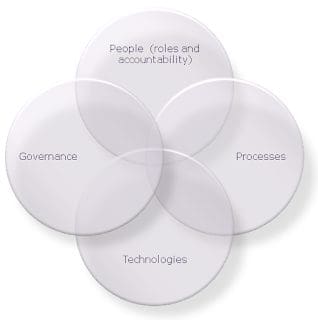
Favorite The demographics of your organisation determine the distribution of knowledge, and therefore the details of the Knowledge Management Framework you need to deploy Here’s another factor that can affect the way you address KM in an organisation; the demographics of the workforce. Because the demographics are is linked to
Read More
 Shared by Nick Milton September 20, 2022
Shared by Nick Milton September 20, 2022

Favorite There is no silver bullet for Knowledge Management, because KM is a management system with many component parts, all of which need to be in place. Bar Silver Bullet by Sprott Money on Flickr We often hear vendors promising us a KM silver bullet – usually some sort of
Read More
 Shared by Nick Milton November 15, 2021
Shared by Nick Milton November 15, 2021

Favorite We know that Knowledge Management requires a management framework, rather than a silver bullet technology. But how do we explain what a management framework is? We know that KM requires a framework of roles, processes, technologies and governance, but how do we explain this to our managers; especially the
Read More
 Shared by Nick Milton October 19, 2021
Shared by Nick Milton October 19, 2021

Favorite One of the major differences between a Knowledge Management Toolbox and a Knowledge Management Framework is that in a framework, the components are joined up. Image from wikimedia commons I have blogged before about the evolution in KM thinking from tool, to toolkit, to framework. I have argued that
Read More
 Shared by Nick Milton February 26, 2021
Shared by Nick Milton February 26, 2021

Favorite There is a lot of value in a KM audit, so long as you do it regularly. In this post, I suggested that there are two types of KM surveys; the audit and the assessment. I said the first was like counting the apples in your orchard, the second
Read More
 Shared by Nick Milton October 19, 2020
Shared by Nick Milton October 19, 2020

Favorite The more time I spend in the field of KM, the more I see certain brands of flavours of the field which share a common name (knowledge management) and common principles, but can use very different roles, processes and supporting technologies. Image from wikipedia Below are the main flavours
Read More
 Shared by Nick Milton June 29, 2020
Shared by Nick Milton June 29, 2020

Favorite There is no universal solution for Knowledge Management in an Organisation, but there is a set of universal principles. A Management Framework for KM is bespoke – not off-the-peg. Each organisation must find its own solution , and must design its own Framework. There is no template, no universal
Read More
 Shared by Nick Milton June 19, 2020
Shared by Nick Milton June 19, 2020

Favorite There is no universal solution for Knowledge Management in an Organisation, but there is a set of universal principles. A Management Framework for KM is bespoke – not off-the-peg. Each organisation must find its own solution , and must design its own Framework. There is no template, no universal
Read More
 Shared by Nick Milton June 19, 2020
Shared by Nick Milton June 19, 2020

Favorite Knowledge management delivers maximum value when applied to high value knowledge, to support high value decisions, and in areas where that knowledge is otherwise at risk of being lost. A typical high value area where major decisions will be made is Mergers and Acquisitions. Image from wikimedia commons,Merger of
Read More
 Shared by Nick Milton June 5, 2020
Shared by Nick Milton June 5, 2020

Favorite What is the Knowledge management solution? That’s a question that’s been debated for two decades, but I would like to take a high-level approach to the question and ask – is the solution a tool, a toolbox, or a management framework? Image from wikimedia commons Is it a tool?
Read More
 Shared by Nick Milton March 10, 2020
Shared by Nick Milton March 10, 2020
![]() Shared by Nick Milton September 20, 2022
Shared by Nick Milton September 20, 2022









